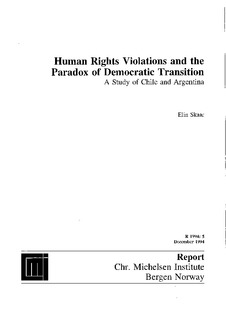| dc.contributor.author | Skaar, Elin | |
| dc.date.accessioned | 2008-03-12T09:42:34Z | |
| dc.date.accessioned | 2017-03-29T09:12:22Z | |
| dc.date.available | 2008-03-12T09:42:34Z | |
| dc.date.available | 2017-03-29T09:12:22Z | |
| dc.date.issued | 1994 | |
| dc.identifier.issn | 0805-505X | |
| dc.identifier.uri | http://hdl.handle.net/11250/2435818 | |
| dc.description.abstract | This comparative analysis of recent transitions to democracy in Argentina and Chile examines (1) the impact of the type of transition on democratic consolidation; (2) how resolving the problem of past human rights violations has influenced civil-military relations and democratic stability; and (3) what has been the role of human rights NGOs, the Catholic Church, andd political parties. A major conclusion is that state-civil society linkages are important to understanding demodratic transition and consolidation and that these linkages have unfortunately been deemphasised in much recent transition theory.
Elin Skaar is a junior professional officer with the United Nations Development Programme (UNDP) in Namibia. She was affiliated to the CMI preparing her MA dissertation on the transition to democracy in Argentina and Chile. | |
| dc.language.iso | eng | |
| dc.publisher | Chr. Michelsen Institute | |
| dc.relation.ispartofseries | Research report | |
| dc.relation.ispartofseries | R 1994: 5 | |
| dc.subject | Human rights | |
| dc.subject | Democratization | |
| dc.subject | Chile | |
| dc.subject | Argentina | |
| dc.title | Human Rights Violations and the Paradox of Democratic Transition. A Study of Chile and Argentina | |
| dc.type | Research report | |
